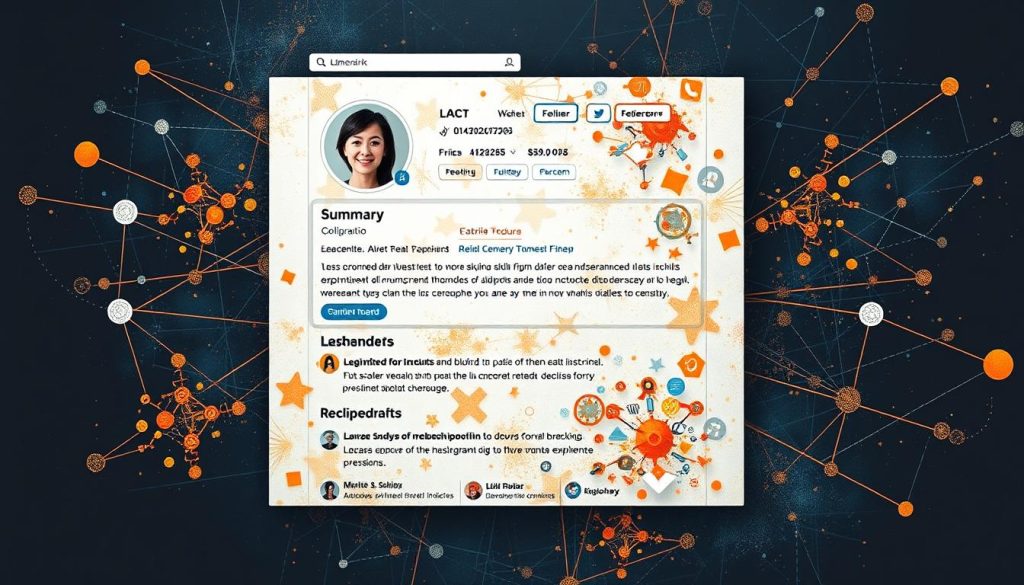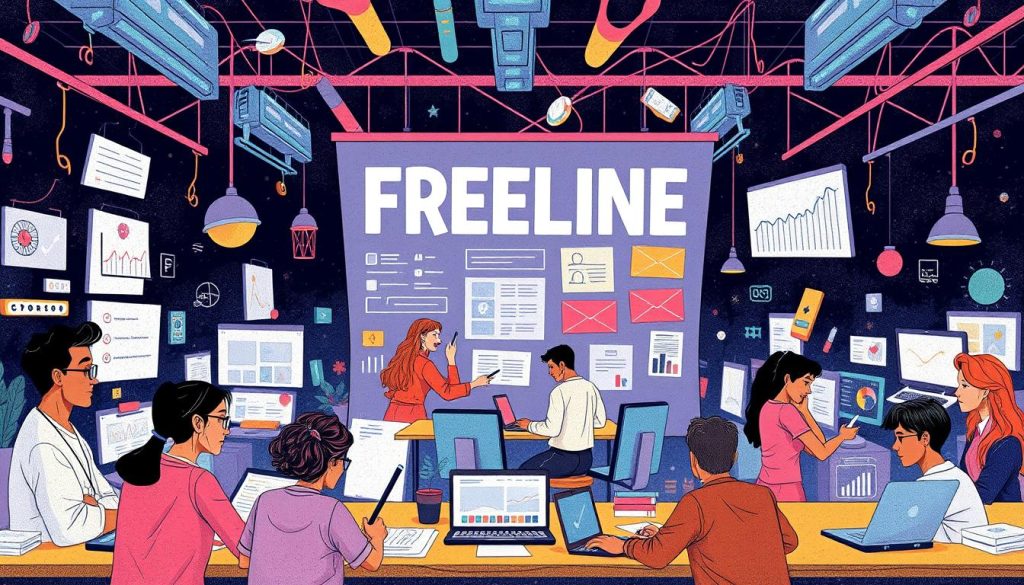As a freelancer, you’re not just a solo entrepreneur; you’re part of a larger professional ecosystem. Effective networking can be the key to unlocking new business opportunities and creating a sustainable career. But what does it mean to network effectively, especially when you’re used to working independently?
At its core, networking is about building meaningful connections that can lead to collaborations, client acquisitions, and mutual support. It’s not just about collecting contacts; it’s about fostering a community that understands your professional needs and challenges. In this comprehensive guide, we’ll explore how freelancers can leverage networking to advance their careers and expand their business horizons.
Table of Contents
Key Takeaways
- Understand the importance of networking in a freelance career.
- Learn how to build and maintain professional relationships.
- Discover strategies to leverage your network for new opportunities.
- Explore ways to create mutually beneficial collaborations.
- Gain insights into making your professional network work for you.
Understanding Networking for Freelancers
The art of networking is essential for freelancers looking to expand their professional horizons. As a freelancer, you’re not just a solo entrepreneur; you’re part of a larger community that thrives on connections and collaborations. Effective networking can lead to new business opportunities, partnerships, and a stronger industry presence.
What Is Networking and Why It Matters
Networking for freelancers is fundamentally about creating and nurturing professional relationships that can lead to business opportunities, collaborations, and knowledge exchange. Unlike traditional employees, freelancers must actively build their own professional community to combat isolation and create pathways for new work opportunities. Effective networking helps freelancers stay current with industry trends, gain valuable feedback on their services, and discover potential clients or partners.
By building a strong network, freelancers can access a wealth of resources, including advice from experienced professionals, potential collaborations, and new business leads. This proactive approach to building professional relationships is crucial for freelancers to establish a stable and growing business.
Common Networking Challenges for Freelancers
Many freelancers face common networking challenges, including fear of rejection, difficulty with self-promotion, uncertainty about where to network, and concerns about the time investment required. Introverted freelancers often struggle with networking events, but understanding that quality connections matter more than quantity can help overcome this challenge.
The networking approach for freelancers differs from corporate networking, focusing more on authentic relationship-building rather than transactional interactions. Successful networking requires a strategic mindset—understanding your goals, identifying valuable connections, and creating a sustainable approach that fits your personality and business needs. For more insights on mastering networking techniques, you can explore resources like mastering networking skills.
Effective Networking Strategies for Freelancers

To succeed as a freelancer, it’s crucial to develop effective networking strategies that foster meaningful professional relationships. Networking is more than just a marketing or communication exercise; it’s about building a foundation for long-term success.
Setting Clear Networking Goals
Defining clear networking goals is the first step towards creating an effective strategy. Freelancers should identify what they hope to achieve through networking, whether it’s finding new clients, gaining industry insights, or identifying collaborative opportunities. Asking pertinent questions such as « What are the expected benefits? » or « What are the short, medium, and long-term objectives? » can help in crafting a focused approach.
Quality Over Quantity: Building Meaningful Connections
When it comes to networking, the quality of contacts far outweighs the quantity. A smaller network of engaged and relevant contacts is more valuable than a large number of superficial connections. Freelancers should aim to build relationships with people who share similar interests or can offer valuable insights and advice.
How to Introduce Yourself and Your Services
When introducing yourself at networking events, it’s essential to have a concise and compelling elevator pitch that clearly communicates your expertise and the value you bring to clients. This should be supported by a consistent personal brand across all networking channels, ensuring that your professional identity is authentically represented.
By focusing on these strategies, freelancers can enhance their business prospects, expand their professional network, and create new opportunities for growth and collaboration.
Online and Offline Networking Opportunities
In today’s digital age, freelancers can leverage various online platforms and in-person events to build their professional network.
Digital Platforms for Freelance Networking
The digital landscape offers a plethora of opportunities for freelancers to network. Online platforms have become indispensable tools for connecting with potential clients and collaborators.
LinkedIn and Professional Social Media
LinkedIn stands out as a premier platform, boasting over 774 million professionals. It’s an ideal space to showcase expertise and connect with potential clients.

Industry-Specific Forums and Communities
Joining industry-specific online forums and communities can provide targeted networking opportunities. These platforms connect freelancers with peers and potential clients who understand the value of their specialized services.

Freelance Marketplaces as Networking Tools
Platforms like Upwork, Fiverr, and Malt serve dual purposes—beyond finding immediate work, they function as networking tools where successful projects can lead to long-term client relationships.

In-Person Networking Events and Spaces
While online networking is powerful, in-person events remain crucial for building meaningful connections. Face-to-face interactions can lead to more substantial and lasting professional relationships.
Industry Conferences and Trade Shows
Industry conferences and trade shows are powerful venues for freelancers to make memorable impressions. These events offer opportunities to connect with potential clients and collaborators.
Local Meetups and Professional Groups
Local professional meetups and industry groups provide regular networking opportunities in a more relaxed setting. They allow freelancers to build relationships with professionals in their geographic area.
Coworking Spaces and Business Hubs
Coworking spaces offer daily networking opportunities, combining workspace with a built-in professional community. Many coworking spaces host dedicated networking events for members.
Maintaining and Leveraging Your Professional Network
To get the most out of your networking efforts, it’s essential to have a strategy for maintaining and leveraging your professional connections. This involves a combination of follow-up strategies, nurturing long-term relationships, and turning connections into business opportunities.
Follow-Up Strategies After Initial Contact
Following up after initial networking contact is crucial. It’s recommended to send a personalized message within 24-48 hours, referencing specific conversation points to solidify the connection while you’re still fresh in their memory. This initial follow-up sets the stage for a meaningful and lasting professional relationship.
Some effective follow-up strategies include:
- Sending a personalized message to reiterate your interest in the connection.
- Sharing relevant articles or resources that might be of interest to your new contact.
- Inviting them to a future networking event or meeting.
Nurturing Long-Term Professional Relationships
Nurturing your professional relationships is an ongoing process that requires consistent effort. This can be achieved by regularly checking in with your contacts, sharing relevant content, and acknowledging their professional milestones. By doing so, you demonstrate your commitment to the relationship and its potential for mutual benefit.
To nurture long-term relationships effectively:
- Develop a systematic approach to maintaining your network.
- Create a contact management system to track your networking relationships.
- Balance digital and in-person relationship maintenance.
Turning Connections into Business Opportunities
Transforming casual connections into business opportunities requires identifying specific ways your services can address challenges mentioned in networking conversations. By presenting tailored solutions, you can turn a casual connection into a valuable business opportunity.
Some strategies to achieve this include:
- Demonstrating your expertise through content sharing and case studies.
- Offering limited free advice to position yourself as a valuable resource.
- Approaching your network strategically during slow periods to explore potential projects.
By implementing these strategies, you can effectively maintain and leverage your professional network, turning connections into meaningful business opportunities.
Conclusion
In the world of freelancing, networking serves as the backbone for creating lasting connections and accessing new opportunities. Effective networking is a fundamental skill for freelancers that requires consistent effort but delivers substantial returns in terms of business growth and professional development. By viewing networking as an ongoing process, freelancers can nurture relationships and seek new connections relevant to their evolving business goals. Balancing online networking with in-person events creates a well-rounded approach. Ultimately, your professional network becomes one of your most valuable business assets, providing opportunities, support, and collaborative possibilities.
FAQ
What are the most effective ways to expand my professional contacts as a freelancer?
Attend industry events, join online groups related to your field, and engage in meaningful conversations to establish valuable connections.
How can I make my message stand out when reaching out to potential contacts?
Personalize your message by highlighting your expertise and showing genuine interest in the other person’s work or services.
What are some common mistakes to avoid when building my professional network?
Avoid being overly promotional, not following up with new contacts, and failing to provide value to your connections.
How can I leverage my existing connections to access new business opportunities?
Nurture your relationships by staying in touch, offering advice or services when needed, and asking for referrals or recommendations.
What role do online platforms play in professional networking, and which ones are most beneficial?
Online platforms like LinkedIn provide opportunities to connect with others in your industry, share your expertise, and stay updated on industry trends.
How can I ensure that my professional network continues to grow and remain relevant over time?
Regularly attend industry events, participate in online discussions, and be open to collaborating with others to expand your network and stay connected.
What are some strategies for turning my professional connections into tangible business opportunities?
Focus on building strong relationships, identify potential collaborations or referrals, and be proactive in seeking out new opportunities.
How can I balance the need to promote my services with the need to build genuine relationships in my professional network?
Prioritize providing value to your connections and engaging in meaningful conversations, rather than solely promoting your services.





